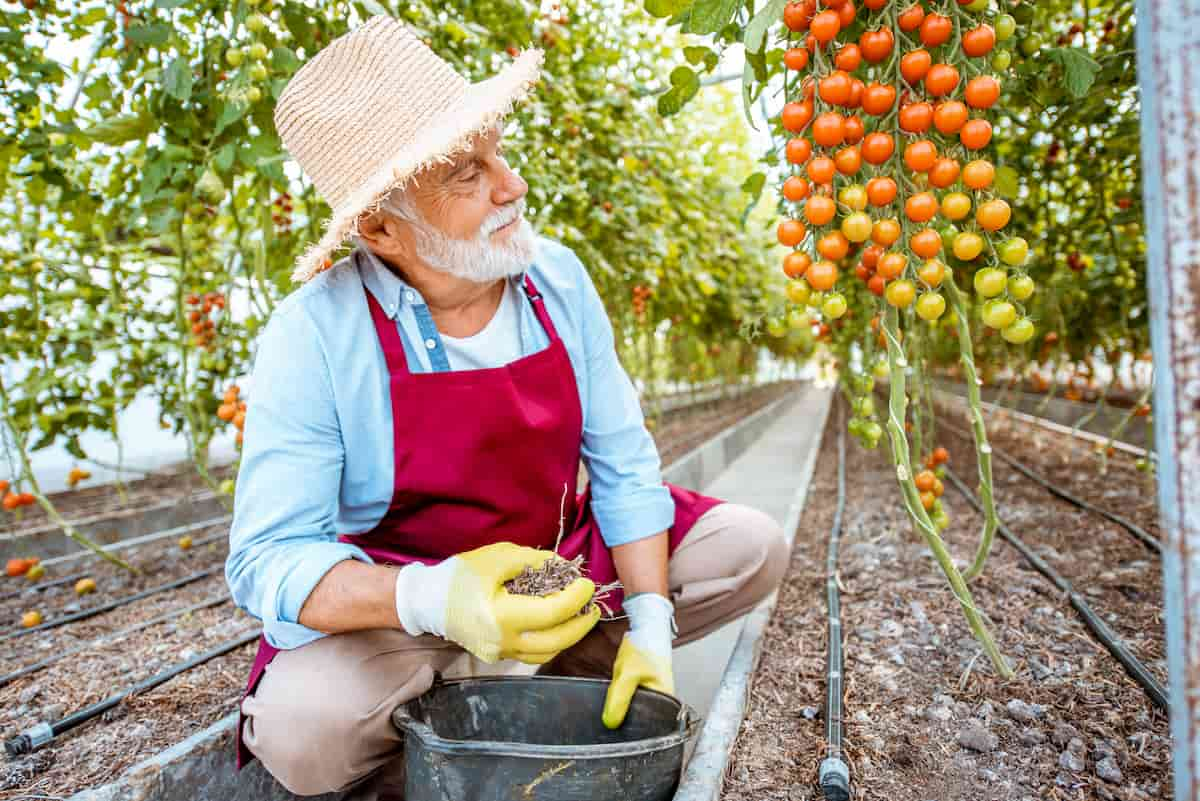Organic tomato fertilizers are composed of naturally occurring plant and mineral matter. Depending on the soil nutrients, tomatoes may require organic fertilizer at certain growth stages. Over time, it improves soil by assisting in the breakdown of organic matter. In addition to the top three major nutrients (nitrogen, phosphorus, and potassium), it contains trace nutrients. In soil, it releases nutrients gradually and lasts for a longer period.

Best Organic Tomato Fertilizers
Alfalfa Meal
Tomato plants benefit from alfalfa meal as a nitrogen source. Alfalfa meal is a complete NPK fertilizer that contains numerous micronutrients and helpful hormones. In addition, alfalfa meal and alfalfa tea fertilizer contain triacontanol, a root-stimulating growth hormone. Growing tomatoes in compost and dressing them with alfalfa pellets is very successful. Reduce moisture loss from evaporation by mulching tomato plants with Alfalfa.
Blood Meal
The blood meal is prepared from the dried blood of animals slaughtered in slaughterhouses. The blood meal’s high nitrogen and protein content makes it an excellent fertilizer for many plants, including tomatoes. Blood meal contains about 13% oxygen, which helps tomatoes produce more fruit. You can increase your tomato harvest and keep your plant healthy and strong by using bone meal on your tomato plants. Your tomato plants may even be protected from deer and moles by it.
Bone Meal
The two key nutrients, phosphorus and calcium, in the bone meal, make it a great addition to many plants, especially tomatoes. As tomato plants grow, phosphorus helps them produce bigger and healthier fruits and supplies them with water. Bone meal also strengthens your tomato plant’s roots and stems, which is important since tomato plants tend to topple over because of their top-heavy nature. The dreaded blossom end rot in tomatoes is also prevented by calcium. Therefore, adding bone meal to your garden next year will result in larger, juicier tomatoes.
Compost
Because compost contains the nutrients and minerals tomatoes need, it is their best fertilizer. High-quality compost piles produce rich organic matter containing essential nutrients and beneficial microbes. As well as fertilizing tomatoes, it allows the soil to retain nutrients and water, neutralizes the soil, and adds beneficial microorganisms. During transplanting, add a significant amount to the bottom of each hole, and side-dress each tomato several times over the growing season. Apply compost tea with some humic acid regularly during the growing season.
Organic Cottonseed Meal
This natural fertilizer can be added as an organic soil amendment when transplanting seedlings. The potassium, nitrogen, and phosphorus ratio in cottonseed meal is 6-2-1. Plants do not receive the nutrients from cottonseed meals immediately; they release them slowly and last for nearly four months. It contains essential elements like magnesium, calcium, copper, sulfur, zinc, and manganese. Choose only organic fertilizers labeled Certified Organic when you purchase this organic tomato fertilizer option.
Animal Manure
Manure may be an option if you do not want to kill beneficial microorganisms that help decompose organic matter. Manure from animals, such as cows, is excellent plant food for tomatoes, but there are a few things to remember before applying it. Tomato nurseries generally use animal manure but don’t use pet manure as it contains harmful pathogens and high toxicity levels. You can only use vegetarian animals such as cows, goats, or horses. Tomato plants should also not be fertilized with chicken manure.
Feather Meal
Hydrolyzed, dried, and ground poultry feathers make up Feather Meal. This organic nitrogen source is perfect for tomato plants because it releases nitrogen slowly. Before planting or side dressing throughout the growing season, feather meal should be incorporated into soils to provide a steady release of nitrogen for optimum plant growth. A sufficient nitrogen supply ensures plenty of shoots, flowers, and fruits for all growing plants.
In case you missed it: Hydroponic Tomato Farming in a Greenhouse: Key Rules to Start from Scratch

Fish Emulsion
Tomato plants benefit from the fish emulsion, which contains nitrogen, phosphorus, calcium, potassium, magnesium, and other trace minerals. It is a fast-acting fertilizer containing calcium, which prevents blossom end rot. Furthermore, tomato leaves are healthy due to their nitrogen content. The gibberellin hormones in this solution will cause your tomatoes to bloom much faster than when they emerge naturally. You can also boost your tomato seedling by drenching the root zone with water diluted with fish fertilizer for plants.
Wood Ash
Wood ash from a wood-burning fireplace is an excellent source of potassium and phosphorous. You can add wood ashes to your tomato garden to improve fertility. Depending on the soil’s composition, too much wood ash can make your soil too alkaline, so don’t add too much. Additionally, the salt in the ash deters slugs, snails, and soft-bodied insects like aphids.
Epsom Salt
The growth of tomatoes requires a lot of magnesium, and Epsom salt provides that magnesium. As a result, you should see more blooms, stronger plants, more fruit production, deeper green color, and sweeter, tastier tomatoes. Place one tablespoon of Epsom salt in the bottom of the hole when planting a tomato plant. A thin layer of dirt should be applied to the Epsom salt before the tomato seedling is placed there.
Kelp Meal
If you do not have access to wood ash, add a few cups of kelp meal instead. When tomato plants are flowering and fruiting, potassium is needed. Potassium plays a crucial role in tomato plant growth, especially when it begins to flower and bear fruit in the final stages of development.
Rock Dust
The yield of tomatoes can be significantly increased by adding rock dust. Moreover, rock dust contained minerals and micronutrients that improved tomato growth and disease resistance. The best way to control disease in tomato plants is to use rock dust products that contain high concentrations of calcium carbonate and calcium oxide. Adding rock dust to the soil in small amounts is recommended since minerals take time to break down and become available to the roots.
Tomato Tone
Tomato tone is an organic feed that can be used on all tomato varieties and certain fruit-producing plants. Through the organic composition of Tomato-tone, your tomatoes will develop more blooms and better tomatoes throughout the season. A tomato tone is applied to the soil before planting seedlings to improve nutrient content. With its high calcium content, Tomato-tone is particularly beneficial for crops prone to blossom end rot.
In case you missed it: How to Control Fungal Diseases in Tomatoes and Effective Management Strategies

Conclusion
The practice of naturally fertilizing tomatoes is not new to tomato growers. Gardeners have relied on synthetic fertilizers for years, believing chemical fertilizers are superior to organic fertilizers. Many have realized, however, that organic gardening methods are the best and most natural way to fertilize tomatoes. Test any of the above natural fertilizer options before using them to maximize your tomato yield.
- Feed Your Flock for Less: Top 10 Tips to Save on Chicken Feed
- Ultimate Guide to Ossabaw Island Hog: Breeding, Raising, Diet, and Care
- Hatching Answers: The Top 10 Reasons Your Chickens Aren’t Laying Eggs
- Eggs and Economics: Breaking Down the Cost of Raising Backyard Chickens
- Defend Your Greens: Proven Methods to Keep Iguanas Out of Your Garden
- Ultimate Guide to Cinnamon Queen Chicken: A Comprehensive Guide for Beginners
- Ultimate Guide to California Tan Chicken: Breeding, Raising, Diet, Egg-Production and Care
- Ultimate Guide to Marsh Daisy Chicken: Breeding, Raising, Diet, and Care
- 10 Types of Chicken Farming Businesses You Can Start for Profits